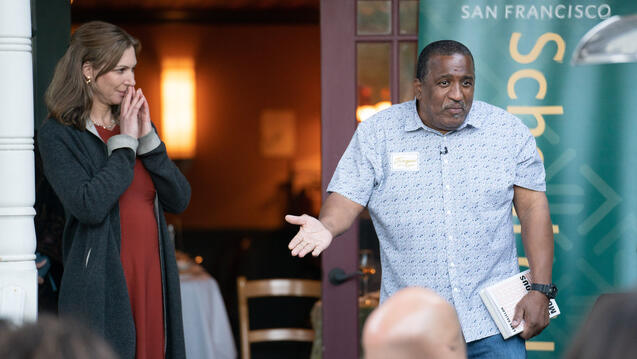Prof. Kaelyn Romey Helps Students Unlock Their Potential

Professor Kaelyn Romey likes a challenge. Each year, she learns a new hobby or skill. One year it was banjo, which Romey admits she hasn’t yet mastered. In other years it was ballet, cooking, and improv comedy.
An expert in tax litigation who spent 12 years working as Senior Counsel in the Small Business and Self Employed Division at the IRS, Prof. Romey recently joined the USF School of Law faculty as a visiting professor.
We recently spoke with Romey about finding inspiration in teaching tax, uncovering students’ hidden potential and how learning improv comedy has challenged her to get out of her comfort zone.
Are there big differences between teaching litigation and teaching tax?
I think people's perception and preconceived notions of tax can be very different from litigation. If you tell someone you are a tax lawyer or that you work for the IRS, they might take a step back from you or assume that the subject matter is dry. The alternative is that they might ask a flurry of questions about their tax returns. It is important to note that “tax” is very broad and it touches almost every area of law. Having a basic understanding in tax is really essential for every lawyer. You can help your clients by being able to identify and understand the tax implications of all business and personal decisions. Having a background in tax is also really interesting, and I know a lot of really happy tax lawyers with very dynamic careers. I wish more lawyers were not afraid of math and numbers -- you know, I don't do that much math.
You’ve said that one of your favorite parts of teaching is helping students unlock their hidden potential. How do you do that?
I try to be really conscious of today’s students and I understand there can be a heightened peer focus. In trial advocacy and litigation, I have found that young lawyers often hold back. I try to help them to find their own authentic voices and to trust their instincts.
In my experience, students often want you to just give them a template, they want step-by-step instructions on how to do it all. In part this is because we are all afraid of making mistakes. I want to meet students where they are, and inspire them to learn to trust their instincts. Why not just be brave, and take a shot at something. I want my classroom to be a safe space to make mistakes, try out new skills or ideas, and to grow and learn. As we build skills and confidence on each assignment, students will have a better jumping-off point for the next.
I practice a lot of “tough love” in my classes. Making students stand up and present when it is uncomfortable-- even though they don't feel quite ready-- then offering an opportunity for a do-over while the stakes are low. It’s about showing students that instead of looking for the exact right way to do it, they can look for their own authentic way of doing it. This brings a lot more voices and diversity to the table, perspectives and ideas we might not see if everyone just did the same thing.
Every year, you take on a new hobby. Is that something you bring into your classes? What is this year’s hobby?
I think that it all falls along the lines of ‘practice what you preach.’ I can't really tell students to take a risk and get out of their comfort zone if I don't also do it. That's where the improv class came in — it was a scary class to take – but it was all about leaving your fears at the door, giving up control, leaning in, and saying yes. There was a lot of laughter and fun involved. This year, I am learning Italian.
What was the hobby that you ended up being the best at?
About 20 years ago, I taught myself to design jewelry. I still use this skill today, and love creating personal gifts for friends and family.
This interview has been edited for length and clarity.


